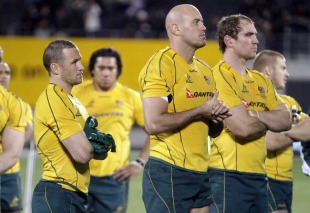|
Australian Rugby
Lack of consistency plagues Wallabies
Keiran Smith
August 16, 2010

The Wallabies have been left in the wake of the 2010 All Blacks
© Getty Images
Enlarge
The Wallabies' soap opera of a Tri-Nations campaign has hit halfway with a spirited, high-octane victory over the Springboks, followed by the humiliation of a home-thrashing by the All Blacks to a redeeming, yet futile performance in Christchurch. Consistency is again proving a curse for a team that is brilliant one moment, forlorn the next. But this is no surprise, given the Wallabies for years have been unable to back up a strong performance the following weekend. John Connolly couldn't achieve it and Robbie Deans sure has not found the magic potion either. The only constant with the Wallabies is that if you see Dr Jekyll, Mr Hyde will not be far behind. After building strong momentum in what was a very good performance against the Springboks, the manner of the defeat to the All Blacks, at home no less, really stung the local pride. The All Blacks are indeed a good team, clearly the best in the world, but even average teams look white-hot when you gift 20-plus points in the opening half and play a man down for most of the match. With the "dogs barking", to coin a phrase used by Australian Rugby Union CEO John O'Neill, Robbie Deans would have been pleased to escape the local media blowtorch and return to the unwavering support of his home town. Clearly the team were also relieved to have an opportunity of redemption and were gallant in their efforts to stay within sight of the rampant Kiwis. Despite the improved score line in Christchurch, in truth, the Wallabies never looked like winning the Test and a long range opportunist try was the only time they breached the 'black curtain'. To be fair, the Wallabies are far from full strength and while it may seem an attempt to deflect increasing criticism, Deans has a valid argument in pointing to the personnel unavailable to him, including Quade Cooper, Rob Horne, James Horwill, Tatafu Polota-Nau, Wycliff Palu, Digby Ioane and Peter Hynes. All first team players. The most missed was Cooper, who is far more direct in attack than Matt Giteau and with a bi-lateral pass of 20 metres off either shoulder he has the ability to place any of his outside backs into the holes which appear in a stretched defence. With debutant Anthony Faingaa, early nerves aside, providing a strong presence in midfield, Deans now has a choice of who to partner Cooper in what will be a brutally physical Test against the Boks in Pretoria - Giteau or Faingaa. The clear loser in this midfield tug-of-war is Berrick Barnes who was one of only two unforced personnel changes (Stephen Moore was the other) for the Christchurch Test and it would appear the Waratahs pivot is now on the outer of Deans' grander 2011 vision. However, as much as it eases the pain to believe that with our best line up we will topple the Kiwis, in reality the gap between the two teams is getting wider in each and every contest. The Kiwis are now technically and tactically better and Graham Henry & Co have out-coached Deans over the past two seasons with a style that continually evolves. While the Wallabies say New Zealand is the benchmark, the risk is by the time they close that gap the All Blacks will have already moved on to yet a higher level.
The pressure is mounting and the first signs of the once rock solid Australian Rugby Union support for the coach has begun to crack. Barely 12-hours after the match, O'Neill offered a 'measured' vote of confidence in a TV interview, saying "we appointed Robbie to do a job, we still believe he is the right person, but the dogs will be barking a bit." Hardly reassuring for Deans, but certainly expected given beating the All Blacks regularly is part of his "key performance indicators". The question surely being asked behind closed doors at ARU is whether to keep faith in a coach who has won just two of 10 Tests in the past two seasons against our key rivals? With a win-loss ratio worse than previous coach John Connolly, is Deans still the right man to lead the Wallabies assault in NZ in 2011? Given where the Wallabies were at the end of the 2007 World Cup, Deans has done a good job rebuilding a scrum which had lost any respect amongst its peers and has greatly improved the depth across what was a very thin national squad. His legacy will include the development of players such as Cooper, Will Genia, David Pocock, James O'Connor, Kurtley Beale, Peter Hynes, the Faingaa twins and Dean Mumm. Deans has always maintained he is preparing a team for the 2011 tournament and judgment is best made on the final product, not a work in progress. It's just a shame the journey to the Promised Land has brought a fair bit of pain and, at times, humiliation. But all that aside, at least we can go to sleep at night comforted in the knowledge the All Blacks have again succumbed to our master, world-wide conspiratory plan of peaking one year too early. Sweet dreams… © Scrum.com
| |||||||||||||||
Live Sports
Communication error please reload the page.
-
Football
-
Cricket
-
Rugby
-
- Days
- Hrs
- Mins
- Secs
F1 - Abu Dhabi GP
Abu Dhabi Grand Prix December 11-131. Max Verstappen ()
2. Valtteri Bottas (Mercedes)
3. Lewis Hamilton (Mercedes)
4. Alexander Albon ()
5. Lando Norris ()
6. Carlos Sainz Jr ()
-
ESPNOtherLive >>
Darts - Premier League
Golf - Houston Open
Snooker - China Open
Tennis - Miami Open

